Whether you are consciously opting not to consume animal products or you have been diagnosed with lactose intolerance, you may find yourself stuck at a crossroads when it comes to choosing the right protein supplement.
Supplementation can support your nutrition levels well by enhancing recovery and supporting all-round wellbeing. Prior to supplementation, it is vital to ensure most of your diet is being fulfilled with whole foods.
Whey protein is derived from cows’ milk and is the most popular form of protein in the sports nutrition and supplements market. Whey protein offers a complete amino acid profile, which are the building blocks of muscle growth, repair, and maintenance. Whey protein also boasts low levels of carbohydrates and fats, meaning the high protein levels of whey ensure your body draws its energy from excess fat stores, aiding in weight loss and suppressing hunger. With whey protein’s impressive benefits, it may seem difficult to find a dairy-free protein powder right for you. To help, we’ve investigated the benefits and convenience of plant-based proteins for the ecologically conscious and the intolerant.
What does it mean to be lactose-intolerant?

If you have been diagnosed with lactose intolerance, this essentially means the sugars found in dairy products (most commonly cows’ milk) cannot be digested properly in your body. Digestion of dairy becomes difficult for the lactose-intolerant because of symptoms such as bloating, fluctuance, abdominal pain, and diarrhea. These symptoms occur due to insufficient stores of the gut enzyme lactase, which is found in the lining of the small intestine. The lack of lactase means that it is very difficult for the milk sugars to be converted into absorbable compounds and therefore the lactose remains undigested as it continues into the large intestine. The large intestine contains a lot of bacteria, which aids in breaking down our food. The bacteria converts lactose partially into acids and gases, which prompts wind, bloating and pain in the lactose-intolerant. For lactose-intolerant people, rather than being absorbed into the bloodstream, lactose attracts water molecules, resulting in watery faeces.
The severity of lactose intolerance varies with each individual, as does the amount of lactose in different dairy products. For example, hard and matured cheese such as Cheddar, mozzarella, and brie, contain little to no lactose and can be consumed by people with lactose intolerance.
It is advised not to eliminate dairy products from your diet entirely, instead, interchange the types of food containing lactose. For example, your lunch meal can include a light cheese and you can still include cows’ milk in your daily coffee.

Milk and other dairy foods are an important source of calcium, which is essential for supporting bone health. So, if you are lactose-intolerant, consider trialing which foods cause a reaction and which are fine to eat without discomfort. According to the Food Intolerance Institute of Australia 67-75%, or two in three Australians, have a dairy intolerance. Such a high percentage of people with lactose intolerances lends itself to many of our favourite supermarket brands being conscious of lactose present in their products. The milk industry has also increased its efforts by offering lactose-free options that contain only small traces of lactose, which have already been broken down prior to consumption. It is advised to avoid most packaged goods in the supermarket if you are lactose intolerant. This is because most processed foods such as pre-packaged cakes, biscuits, cheese sauces, and soups contain lactose. Often lactose isn’t explicitly listed in these products’ ingredients lists, instead, they list grouped ingredients such as ‘milk solids’. It is safe to eliminate all pre-packaged processed goods that include ‘milk solids’ as lactose is always present in this ingredient grouping.
What does it mean to be vegan?

Many people choose to lead a lifestyle which minimises the number of animal products they use or consume for dietary intolerances and/or conscious ecological reasons. It is important to define the specifics of being a vegan as, when it comes to choosing the correct protein supplements, every ingredient matters.
A vegan is someone who establishes a way of living that seeks to exclude all forms of exploitation and cruelty of animals through the means of food, clothing and other lifestyle choices (for example, cleaning products). One thing that all vegans have in common is the choice to follow a plant-based diet that avoids all animal foods including meat, fish, insects, dairy, eggs, and honey. You can look at veganism either in terms of what it excludes or what it includes regarding diet. Although vegetables and fruits are the substance of a vegan diet, this does not mean that taking protein powders is unnecessary.
Plant-based proteins
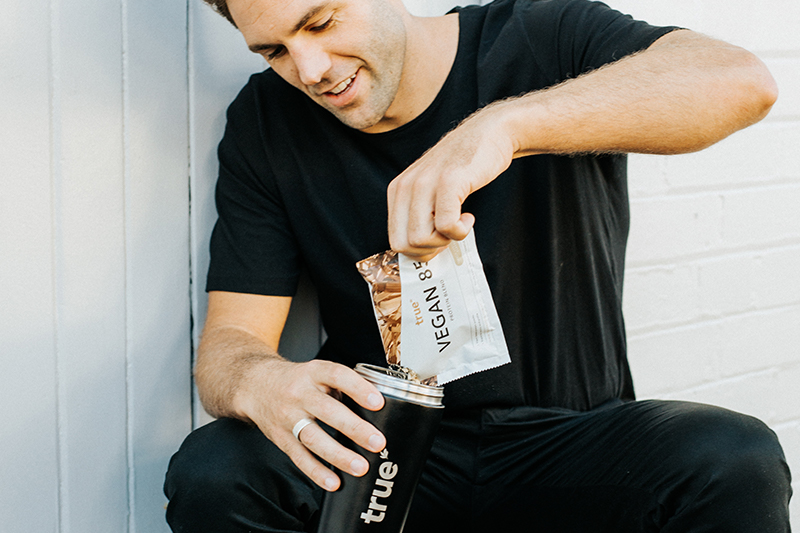
Plant-based proteins are the ideal alternatives for vegans and dairy-intolerant people who are looking to increase their protein intake for health and/or training. The most obvious benefit of plant-based proteins is that plant-based proteins are derived only from plants and therefore doesn’t involve any animal by-products or produce. Plant-based proteins are also hypoallergenic, which means your gut is very unlikely to have a negative reaction.
The human body contains 11 amino acids but must receive another nine from foods. Animal products are complete proteins, which means they contain all nine required amino acids. It is harder to receive all the amino acids necessary when following a plant-based diet, however, a dairy-intolerant or vegan individual should actively try to eat a varied diet of plant-based foods to equip their body with the correct levels of amino acids.
Plant-based ingredients can be excellent sources of protein with many products such as soybeans, tofu, nuts, seeds and quinoa reaping the benefits of complete proteins containing all nine essential amino acids required for muscle development, repair and growth.
It is important to discuss dietary exclusions and portions with your health care practitioner or nutritionist to ensure your intake of protein is adequate. Learning how to effectively supplement your diet without animal products is essential.
Vegan 85 - what can it do for me?
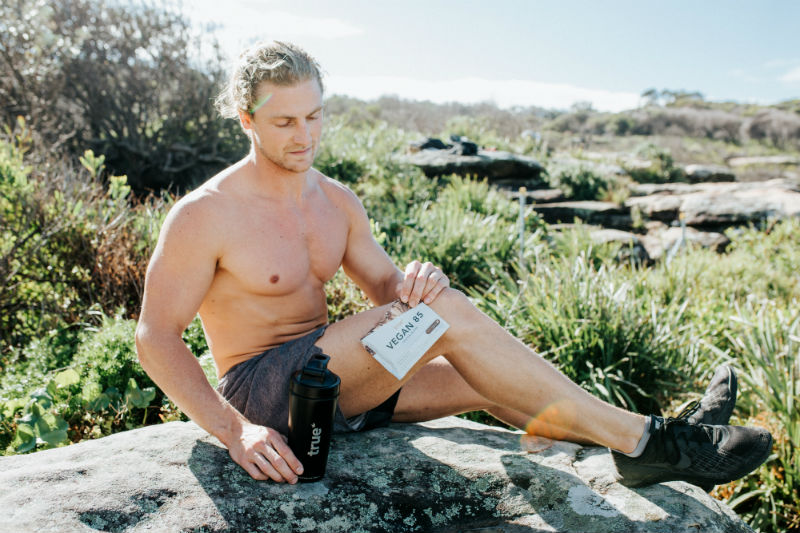
True Protein’s Vegan 85 is a dairy-free protein blend with a rich amino acid profile (organic compounds that bond together to form proteins in food) thanks to the combination of pea, pumpkin and brown rice proteins. Vegan 85 is derived from 100% plant-based sources including pea protein sourced from Belgium, organic pumpkin protein from the Netherlands and organic brown rice protein from the US. At True Protein, we pride ourselves on sourcing the highest quality ingredients with no added preservatives, artificial colours or flavours.

Vegan 85 is ideal for vegan and dairy-intolerant individuals post-workout. Vegan 85 should be taken within 15-30 minutes following a workout to help kick-start the recovery process and alleviate delayed onset muscle syndrome. Vegan 85 is a convenient way to boost your daily protein intake whether consuming your shake with milk or water as a high-protein snack or blending the powder into a smoothie for breakfast. Vegan 85 has endless possibilities due to the texture and nature of the blend. Because Vegan 85 is a plant-based protein it tends to retain a lot more moisture, making it perfect for baking. Vegan 85 is a great substitute for flour and, with True Protein’s large range of natural flavours, you can create many baked goods and recipes. Check out True Protein’s recipe inspiration here
Vegan Superfood - what can it do for me?
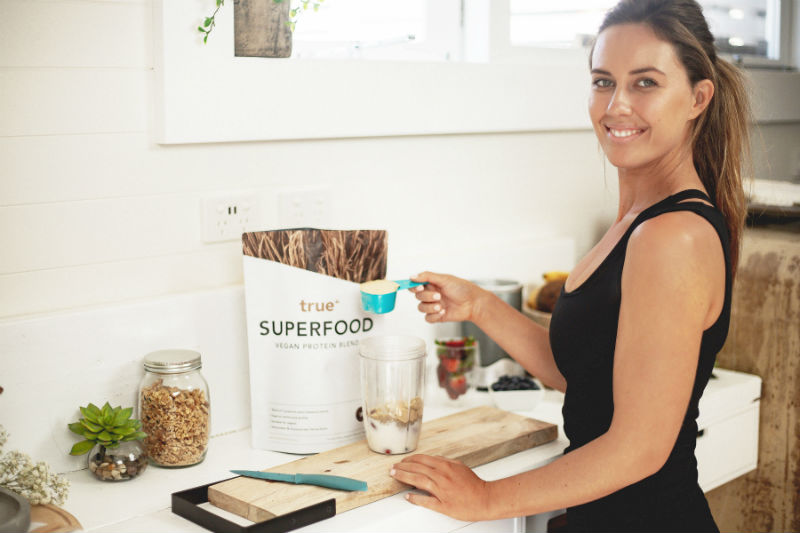
True Protein’s Vegan Superfood blend is a plant-based protein with a dense nutrient profile. Vegan Superfood combines pea protein, organically-sourced brown rice protein, and pumpkin protein. This tri-blend provides over nine natural powdered whole foods containing essential and non-essential amino acids. Vegan Superfood supplies a rich source of dietary fibre, prebiotic fibre and resistant starch enabling our bodies to regulate and eliminate bloating in the gut.
Vegan Superfood is a great alternative protein source for vegan and dairy-intolerant individuals. Nuts, seeds, vegetables, fruit, and wholegrain extracts provide a thick, dense powder perfect for meal replacements or adding to smoothies. With the carefully balanced formulation, Vegan Superfood supports weight loss with added vitamins, minerals, fibre, good fats, antioxidants, and phytonutrients.
Whey options for the lactose intolerant
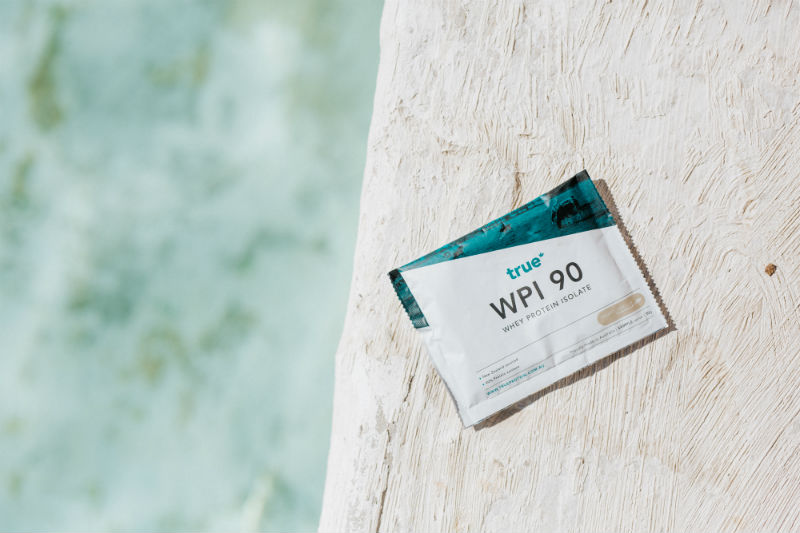
True Protein’s Whey Protein Isolate (WPI 90) is commonly consumed by people with lactose intolerance without experiencing any adverse symptoms. This is because WPI 90 is a unique protein supplement that undergoes an ultrafiltration process. The ultrafiltration process means that the lactose and carbohydrates are almost entirely stripped away, making it the purest form of protein derived from New Zealand grass-fed whey protein on the market. If you are going to trial WPI 90, exercise caution and start by drinking in smaller doses to see how it digests in your body. It is suggested that those with lactose intolerance should take care to avoid products that mix whey protein isolate and concentrate together.
References
https://www.betterhealth.vic.gov.au/health/conditionsandtreatments/lactose-intolerance
https://www.canstarblue.com.au/groceries/lactose-intolerance-on-the-rise-in-australia/
https://daa.asn.au/smart-eating-for-you/smart-eating-fast-facts/medical/understanding-lactose-intolerance/
https://www.medicalnewstoday.com/articles/321474.php
https://www.vegan.com/why









 Meal Preps
Meal Preps
 Nutrition Tips
Nutrition Tips
 Exercise
Exercise
 News & Updates
News & Updates
 Lifestyle
Lifestyle
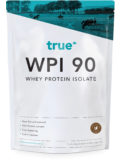
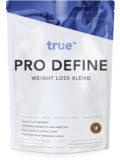




Leave a comment